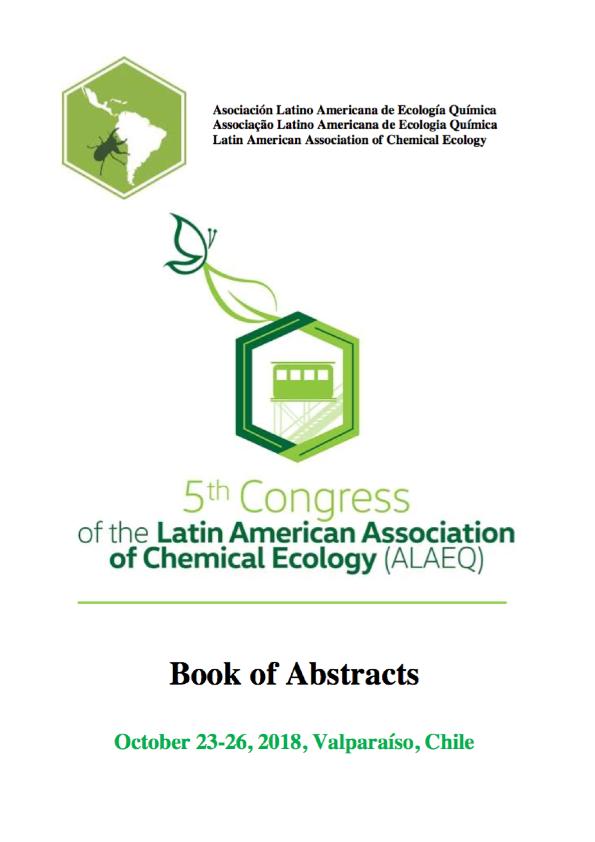Mostrar el registro sencillo del ítem
dc.contributor.author
Valladares, Gabriela Alejandra

dc.contributor.author
Coll Araoz, Maria Victoria

dc.contributor.author
Vera, Teresa
dc.contributor.author
Fernandez, Patricia Carina

dc.date.available
2023-02-01T13:59:26Z
dc.date.issued
2018
dc.identifier.citation
Herbivory by conspecifics affects behavior and development of Nematus Oligospilus females and their offspring; 5th Cogress of the Latin American Association of Chemical Ecology; Valparaíso; Chile; 2018; 1-2
dc.identifier.uri
http://hdl.handle.net/11336/186438
dc.description.abstract
In most herbivores, females oviposition choices are crucial for their offspring, because larvae lack mobility to select their own feeding places.The willow sawfly, Nematus oligospilus (Förster), is an exotic pest in Salix commercial forests and has been reported worldwide. Females of this species must find and recognize their host plant when they emerge as adults after pupating in the soil. In the context of the preference-performance hypothesis, we evaluated the effect of conspecific herbivory on the oviposition behavior and the larval performance of N. oligospilus females, reared on damaged and undamaged plants; and we compared the chemical profile of volatiles of damaged and undamaged plants.We conducted behavioral experiments to see how females make oviposition decision. N. oligospilus females preferred leaves of Salix humboldtiana without previous exposition to larvae of its own species for oviposition. Since females oriented towards undamaged leaves without contact, results suggested that a long distance cue could be acting as a first repulsive system alarm of the damaged plant. Then, we evaluated larvae development on damaged and undamaged leaves. We found that the first stages of development were affected since the percentage of hatching was lower, the larval size was smaller and the time to pupation was higher in larvae reared on damaged plants. We did not find significant differences in the pupal weight and fecundity from individuals reared either on damaged or undamaged leaves. Finally, in a search of the chemical cues associated to this host accepting behavior, plant volatiles were analyzed. We found significantly more sesquiterpenes in damaged plants, particularly germacrene D, which was released in higher amounts in the previously induced feeding plants. We proposed that these compounds could be acting as important cues to avoid unfavorable leaves for the larvae.
dc.format
application/pdf
dc.language.iso
eng
dc.publisher
Pontificia Universidad Católica de Valparaíso

dc.rights
info:eu-repo/semantics/openAccess
dc.rights.uri
https://creativecommons.org/licenses/by-nc-sa/2.5/ar/
dc.subject
HERBIVORY
dc.subject
SEMIOCHEMICALS
dc.subject
SALIX HUMBOLDTIANA
dc.subject
HERBIVORE PERFORMANCE
dc.subject.classification
Zoología, Ornitología, Entomología, Etología

dc.subject.classification
Ciencias Biológicas

dc.subject.classification
CIENCIAS NATURALES Y EXACTAS

dc.title
Herbivory by conspecifics affects behavior and development of Nematus Oligospilus females and their offspring
dc.type
info:eu-repo/semantics/publishedVersion
dc.type
info:eu-repo/semantics/conferenceObject
dc.type
info:ar-repo/semantics/documento de conferencia
dc.date.updated
2022-12-22T10:12:28Z
dc.journal.pagination
1-2
dc.journal.pais
Chile

dc.journal.ciudad
Valparaíso
dc.description.fil
Fil: Valladares, Gabriela Alejandra. Universidad Nacional de Tucumán. Facultad de Agronomía y Zootecnia; Argentina. Consejo Nacional de Investigaciones Científicas y Técnicas. Centro Científico Tecnológico Conicet - Tucumán; Argentina
dc.description.fil
Fil: Coll Araoz, Maria Victoria. Consejo Nacional de Investigaciones Científicas y Técnicas. Centro Científico Tecnológico Conicet - Tucumán. Planta Piloto de Procesos Industriales Microbiológicos; Argentina
dc.description.fil
Fil: Vera, Teresa. Universidad Nacional de Tucumán. Facultad de Agronomía y Zootecnia; Argentina
dc.description.fil
Fil: Fernandez, Patricia Carina. Instituto Nacional de Tecnología Agropecuaria. Centro Regional Buenos Aires Norte. Estación Experimental Agropecuaria Delta del Paraná; Argentina. Consejo Nacional de Investigaciones Científicas y Técnicas; Argentina
dc.relation.alternativeid
info:eu-repo/semantics/altIdentifier/url/http://www.alaeq.org/wp-content/uploads/2018/11/Book-of-Abstract-ALAEQ-2018-FINAL.pdf
dc.conicet.rol
Autor

dc.conicet.rol
Autor

dc.conicet.rol
Autor

dc.conicet.rol
Autor

dc.coverage
Internacional
dc.type.subtype
Congreso
dc.description.nombreEvento
5th Cogress of the Latin American Association of Chemical Ecology
dc.date.evento
2018-10-23
dc.description.ciudadEvento
Valparaíso
dc.description.paisEvento
Chile

dc.type.publicacion
Book
dc.description.institucionOrganizadora
Pontificia Universidad Católica de Valparaíso
dc.description.institucionOrganizadora
Asociación Latinoamericana de Ecología Química
dc.source.libro
Book of Abstracts: 5 th Congress of the Latin American Association of Chemical Ecology
dc.date.eventoHasta
2018-10-26
dc.type
Congreso
Archivos asociados
